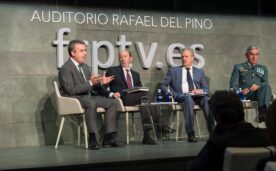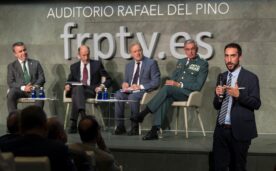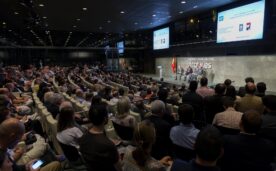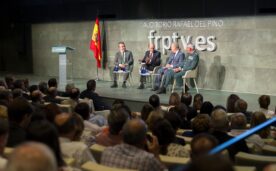Alfredo Pérez Rubalcaba, Manuel Sánchez Corbí, Lorenzo Silva and Manuel Campo Vidal
Summary:
On the occasion of the presentation of the books "Historia de un desafío" and "Sangre, sudor y paz: La Guardia Civil contra ETA", the dialogue "Liderazgo y seguridad: la Guardia Civil en la lucha contra el terrorismo" was held on 10 September 2017 at the Rafael del Pino Foundation, with the participation of the former Minister of the Interior, Alfredo Pérez Rubalcaba; the Civil Guard Colonel Manuel Sánchez Corbí, head of the Central Operative Unit (UCO), and the writer Lorenzo Silva, co-author of the works. The event began with a speech by Lorenzo Silva, who stressed that the fight against ETA had to be told as a great story, without renouncing the epic, because it is the story of the fight for the freedom of Spaniards and, in particular, for the freedom of the Basques. For Silva, a story like this, constructed from the first-hand experiences of those who fought against ETA and their families, is a necessary, therapeutic and enlightening story. History is necessary because in Spain, he said, we have a tendency to neglect, which means that, time and again, we lose the stories and their lessons. It is therapeutic because we Spaniards have a certain complex that we do things badly. However, this is not the case, as evidenced by the fact that we have been able to defeat the most professional and technically superior terrorist group in the history of the world. And it is enlightening because it brings to light the values of sacrifice, courage and effort that make a society strong and dignified. The journalist Gonzalo Araluce, co-author of the book, then spoke briefly, stressing that it is a chronicle covering 50 years of history, which explains how the Guardia Civil became the spearhead of the fight against ETA, which has allowed us to be where we are today. For his part, Colonel Manuel Sánchez Corbí, who has dedicated his whole life in the Guardia Civil to the fight against ETA, explained that he felt that everything they had experienced had to be told because the bad guys were telling another story, that of the draw, when ETA was defeated by a landslide. It is, he said, a sad story but one that ends well and had to be told because there was nothing written about how ETA began and why, how it evolved and how the Guardia Civil, which at the beginning was light years behind the terrorist group, evolved with it. Another reason for writing the book, Sánchez Corbí explained, was that behind the fight against ETA there are people who deserve to be more than just a number in the tally of victims. It was necessary to put a face to many people who should have a page in history, people who contributed to the fact that we can live in peace today. The murders of civil guardsmen, he recalled, made us say "either we win or we die", and recalled that half of the civil guardsmen murdered were under 30 years old. "All of this had to be valued," he stressed. Finally, he referred to the work of France. Our neighbour on the other side of the Pyrenees has been criticised because, in the first years of the fight against ETA, it gave the terrorist group the cover it needed. This was true up to a certain point. But from that moment on, France evolved and that made it possible to defeat ETA. Without France's collaboration, ETA would still be killing today, he warned. In turn, Alfredo Pérez Rubalcaba said that the book is a magnificent manual on the fight against terrorism and highlighted four fundamental aspects of the book that are fundamental to defeating ETA. Firstly, the book highlights the value of intelligence, of information and how it can be analysed over and over again until even the most insignificant thing that could be used to combat ETA can be extracted. In a way, the text is a chronicle of how the Guardia Civil learned to work with information. Secondly, there is the importance of controlling anxiety, of learning to wait for everything to lead to the culmination of an important operation, instead of rushing to close down smaller operations. Thirdly, Rubalcaba stressed that it is clear from the book that the Guardia Civil was equipped with magnificent technology, to the point that when ETA reached the network, it found that the Guardia Civil was already there. Finally, he highlighted France's cooperation. In his opinion, these four things are what define the end of ETA. Finally, Rubalcaba pointed out that the book describes what the Guardia Civil is like: they are loyal, comrades and brave.
The Rafael del Pino Foundation is not responsible for the comments, opinions or statements made by the people who participate in its activities and which are expressed as a result of their inalienable right to freedom of expression and under their sole responsibility. The contents included in the summary of this conference are the result of the debates held at the meeting held for this purpose at the Foundation and are the responsibility of their authors.
The Rafael del Pino Foundation is not responsible for any comments, opinions or statements made by third parties. In this respect, the FRP is not obliged to monitor the views expressed by such third parties who participate in its activities and which are expressed as a result of their inalienable right to freedom of expression and under their own responsibility. The contents included in the summary of this conference are the result of the discussions that took place during the conference organised for this purpose at the Foundation and are the sole responsibility of its authors.







